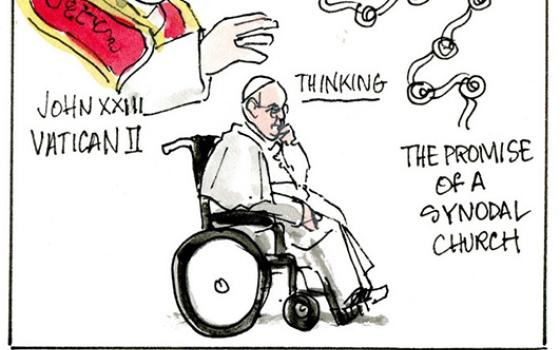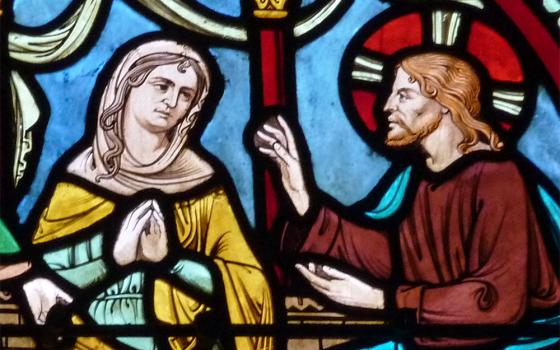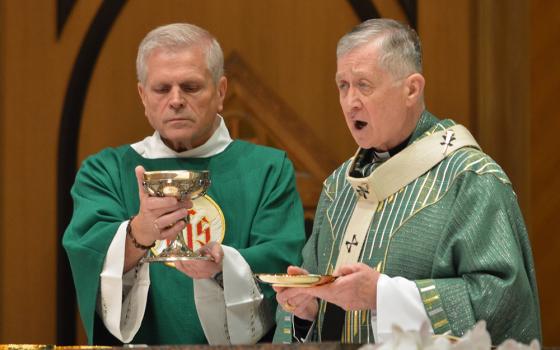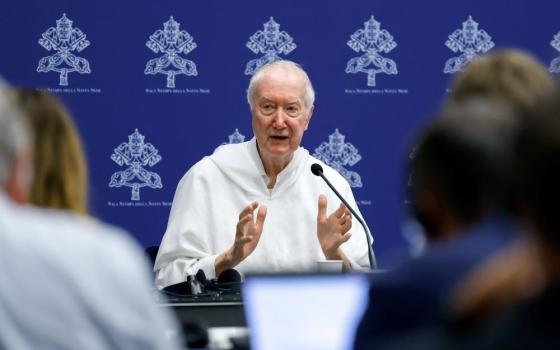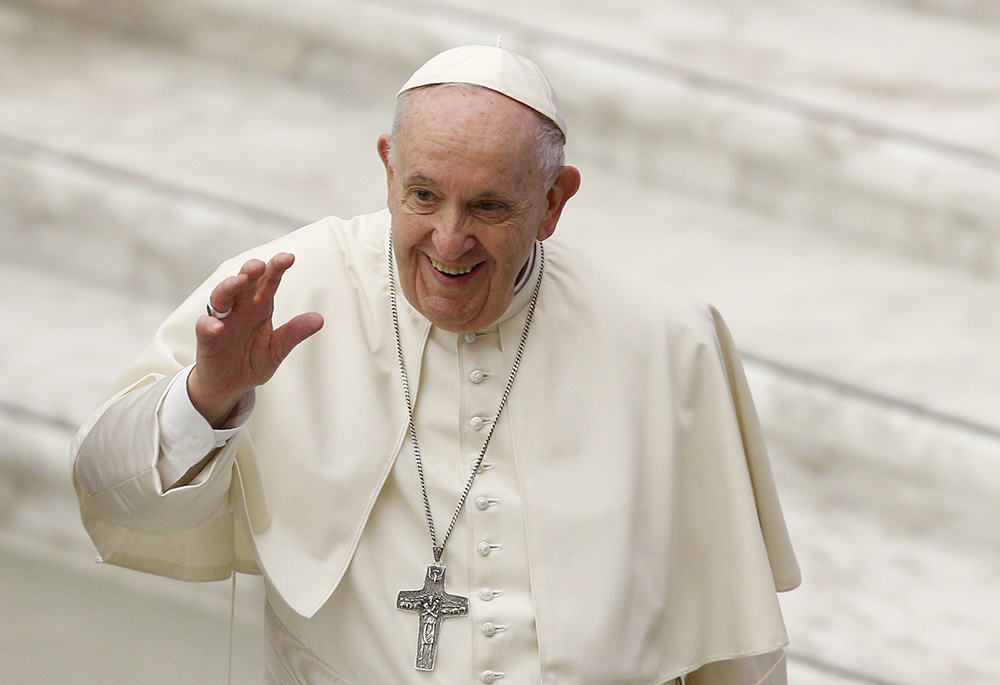
Pope Francis greets the crowd during his general audience in the Paul VI hall Jan. 26 at the Vatican. (CNS/Paul Haring)
Pope Francis will meet with Catholic university students across the Western Hemisphere in a virtual dialogue hosted by Loyola University Chicago on Feb. 24 as part of the ongoing consultation process for the Synod of Bishops.
In a Zoom call scheduled for at least 75 minutes, the pope will listen and speak with students from North, Central and South America, as well as the Caribbean. The students will discuss their studies and share perspectives on issues that impact their lives, especially immigration and matters related to economic and environmental justice.
"We're connecting students across these borders, and putting them in dialogue with each other, to think about the ways that they can address these shared concerns," said Peter Jones, the interim dean of the Institute of Pastoral Studies at Loyola University Chicago.
The dialogue — which university officials believe is the first of its kind that Francis will hold with a U.S.-based university — grew out of Loyola University's efforts to participate in the 2021-23 Synod of Bishops on synodality.
"Our intention was to create a series of events running parallel to the synod process, but for the university community," said Jones, one of the lead organizers for the Feb. 24 dialogue.
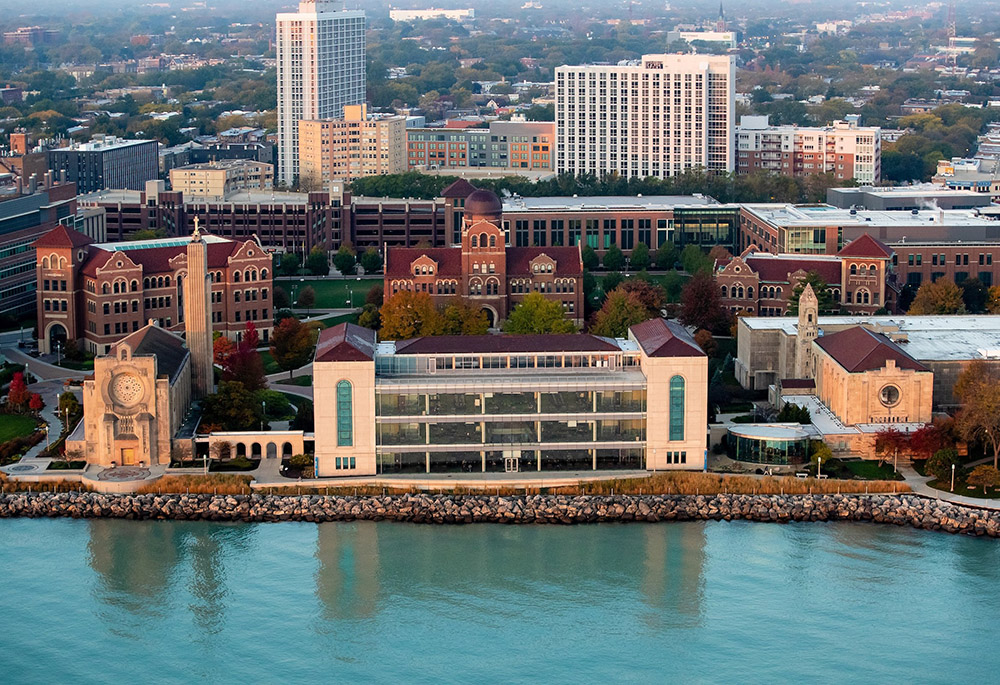
An aerial view of the Lake Shore campus of Loyola University Chicago is seen in this 2019 photo. (CNS/Courtesy of Loyola University Chicago/Lukas Keapproth)
Jones told NCR that the idea to invite Francis to participate in the university's synodal activities was raised in a somewhat joking manner among colleagues. But Emilce Cuda, head of the Vatican's Pontifical Commission for Latin America who also teaches as an adjunct at Loyola's institute, reached out to the pope last month and invited him.
About a week after Cuda's invitation, Francis said yes.
"We were shocked," Jones said. "But I think we connected with a deep interest of his that he already had to connect with students, especially students who are crossing boundaries, students who aren't typically heard from, students who are migrants, and therefore slip through the cracks and are not normally able to participate in formal institutions."
Cuda told NCR that she didn't need to "convince" the pope to participate in an event that Loyola is calling the Building Bridges Initiative. Cuda said the dialogue aligns with Francis' call to build bridges between people and his understanding that the world's youth have important insights to offer today.
"In Christus Vivit, he wrote that the youth are the present, not the future, and we need to hear from them now," said Cuda, referencing Francis' 2019 post-synodal exhortation to young people.
Argentine theologian Emilce Cuda is pictured with the pope at the Vatican March 17, 2017. (CNS/Vatican Media)
"I think the Vatican had been looking for something like this. And the fact that we are bridging all the Americas, North and South, bringing university students together. … It all just kind of fit," said Michael Murphy, director of the Hank Center for the Catholic Intellectual Heritage at Loyola.
Murphy, who is also helping to organize the dialogue, said the event will bring together students from eight regions in the Americas. Each region has a "student synodal group" of several dozen students that will meet before the Feb. 24 event to share insights and experiences. Many of the students are migrants or children of immigrants.
"We're privileging the voices of migrants and people from migrant families," Jones said. "In a way we want to lift up their perspective. We want to enable their agency in providing insights and real action and ideas into solving these challenges."
Each student synodal group will nominate a representative to speak with Francis. During the dialogue, pairs of students — one from the north and the other from the south — will take turns speaking with the pope. The dialogue will have real-time translations in English, Spanish and Portuguese.
"What we're hoping comes out of these student groups is the beginning of a community," said Murphy, who added that the Building Bridges Initiative is seeking to follow the pope's lead by fostering relationships between university students and academics across the hemisphere.
"We want to be synodal in doing this," Murphy said. "We're performing synodality, modeling it and performing it. We're trying to be what the pope is requesting."
Advertisement
Francis and other church leaders have framed synodality as a decisive step in the church's renewal that the Second Vatican Council proposed more than a half century ago. In an October 2015 Vatican address, Francis said synodality is the path that "God expects of the Church of the third millennium."
"Historically, we've just finished the first phase of Vatican II," Murphy said. "This is the next phase. This is a renewal. The focus is on young people whom we're hemorrhaging from the church."
Cuda said the Feb. 24 dialogue and the preparations leading up to it demonstrate how synodality can be applied in different settings throughout the church and society. She added that the dialogue can not only "build bridges" between North and Latin America, but also enrich academics' research while giving a needed venue for open discussion.
"It's important because sometimes governments don't have the possibility to speak about problems freely because of geopolitical problems. But the young people can do that," Cuda said. "They are young, they have dreams, they can speak freely, they can express their dreams for the future, and they can discuss the problems of the culture in a way that political [leaders] may not be able to."
The Feb. 24 dialogue will mainly feature students from Jesuit universities and other Catholic institutions of higher education. Jones said he and his colleagues hope to leverage the work that has gone into organizing the event "to keep people talking" well into the future.
"We're pretty excited and motivated as to what this could all mean," Jones said.





